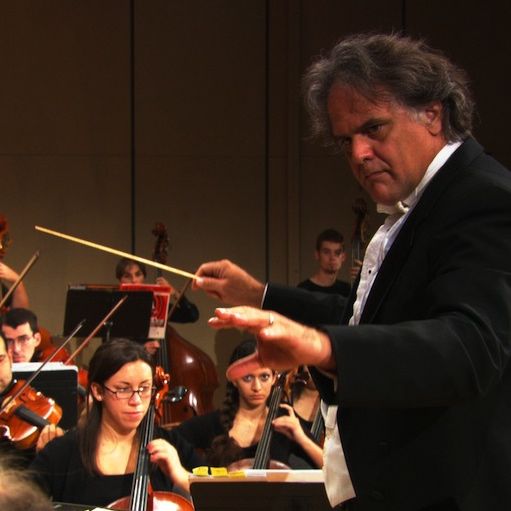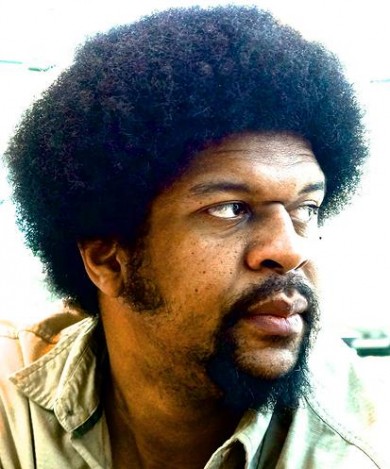Festival Miami to lead off with music made in America

Thomas Sleeper will kick off this year’s Festival Miami on October 10 with a concert of American music performed by the Frost Symphony Orchestra.
The American composer Paul Creston showed fine penmanship in writing down the notes of his music, a minor achievement perhaps, but one that spared the eyesight of the young musicians of the University of Miami.
Despite the late composer’s prominence in 20th-century American music, no printed edition of his Saxophone Concerto exists for full orchestra. So Thomas Sleeper, conductor of the university’s Frost Symphony Orchestra, arranged to rent copies of the parts in the composer’s own hand for the October 10 concert that will open the university’s annual Festival Miami.
“That’s how it’s available, and that might be why it’s never been recorded,” he said. “As a conductor, I enjoy it because I can see the energy in the way in which Creston draws a crescendo.”
But the absence of a printed edition is also a measure of the neglect of Creston’s music, along with that of many of his colleagues. And the opening concert of Festival Miami, the university’s month-long series of classical, jazz, rock, country, blues and Latin music, addresses this with a program called “Made in America” that steers clear of the European composers who dominate the typical classical concert.
The concert runs the gamut from the well-known to the obscure, from the Broadway-inflected tunes of Leonard Bernstein’s Candide Overture to the grim, thumping dissonances of Carl Ruggles’ Sun-Treader. The Creston concerto will feature saxophonist Dale Underwood, a faculty member of the university’s Frost School of Music with an international solo career. Also on the program is the Barber Violin Concerto with soloist Michael Ludwig, Ives’ Unanswered Question and the world premiere of a work by Matthew Evan Taylor, a UM doctoral student.
Such works provide different challenges to the orchestra’s young musicians than do the compositions of Beethoven, Brahms and the other composers that form the backbone of the symphonic literature. “It’s repertoire that’s very important for my students to do,” Sleeper said. “We did Rite of Spring last year, and Ruggles’ Sun-Treader is much more complicated to pull off. Educationally it’s a really great program for us to do.”
Ruggles, who lived from 1876 to 1971, was a New Englander who didn’t spend a lot of time worrying about whether his works or his personality would appeal to the public. A man with the racial views of Richard Wagner (he was always grumbling about the influence of Jews in American music) who wrote in the astringent, atonal style of Arnold Schoenberg, he remains a tough sell to audiences to this day.
Sun-Treader, a tone poem about 15 minutes long, is his most famous work, a gripping, heroic composition, with moments of searching intimacy framed by craggy, timpani-pounding dramatics. In his book on 20th-century music, the critic Alex Ross called Sun-Treader “one of the most tautly argued atonal works in the literature, as propulsive as Beethoven’s Fifth.”
“The Ruggles, I think, is a real masterpiece,” Sleeper said. “It’s requires a bit more rehearsal time. There are technically difficult things to play, leaps and complex interactions. But the difficulties are in making the structure happen musically. In the Ruggles, the first 14 bars cover the gamut of human expression. You have to be able to shift in a very fluid way. With Beethoven you might have a very dramatic shift from violent to beautiful. In Ruggles, it melds from one into the other.”
The latest addition to American music will be made the night of the concert, with the world premiere of Three Glorious Days, an orchestral work by Matthew Evan Taylor. It’s probably the only work to claim inspiration from the French Revolution of 1830, Berlioz’s Symphonie Fantastique and the 2012 reelection of President Barack Obama.
The title of Taylor’s new work refers to the Trois Glorieuses of the French Revolution of 1830, which saw King Charles X replaced by his cousin Louis-Philippe, Duke of Orléans, who would rule for 18 years as a constitutional monarch. Taylor, who composed the work during President Obama’s successful reelection campaign, saw parallels between the two events.
“It was kind of this meditation on the desire to get outside the status quo, only for the status quo to return, in a sense,” he said. “With Obama being such an iconoclastic—such a seemingly iconoclastic—president, if you compare him to past presidents he’s not that different really. What’s extraordinary about him now is he’s in an environment that’s very hostile to compromise or even mediation. That’s kind of why that was an inspiration to me. There’s no telling where I’ll pull inspiration from.”
The year 1830 also saw the world premiere of Berlioz’s revolutionary Symphonie Fantastique, a work that has long fascinated Taylor. “In the fourth movement, the “March to the Scaffold,” there’s a section right at the end where the primary melody in the symphony comes in and stops short with a huge hit in the strings and winds, the guillotine dropping on the lover’s head, and then giving you the impression of a head falling down into the basket,” he said. “When I first heard it, I thought this is so gruesome and such a literal thing. I decided I would take that gesture and make it a structural element within the piece.”
The 39 concerts, master classes and other events of Festival Miami cover a vast range of music. There will be an evening of classical guitar, focusing on the music of the Spanish composer Joaquín Rodrigo. The famous soprano Dawn Upshaw will perform the Florida premiere of Winter Morning Walks, the Grammy-winning song cycle by the American composer Maria Schneider, with the composer conducting the Frost School’s Henry Mancini Institute Orchestra. The Ukrainian pianist Vadym Kholodenko, gold medal winner in the 2013 Van Cliburn International Piano Competition, will play a recital. Among the non-classical concerts will be performances by country music star Craig Campbell, jazz bassist John Clayton, jazz singer Patti Austin and the Latin Grammy-winning singer Gaby Moreno.
But the opening concert will be all-classical and all-American, with works that Sleeper says are much more related to each other than they might appear, all displaying varied takes on their inherited European musical tradition.
“I was trying to make a mixture of things that have some relationship to each other, both musically and historically, but giving a broad spectrum of American concert music,” he said “One of the things all these pieces have in common is a use of melodic line. Although they’re all American, there’s a relationship back to Bach.”
And as saxophonist Dale Underwood takes the stage to play the Creston concerto, the members of the orchestra may be leaning a little closer to their stands to read from the composer’s manuscript, a task made a bit easier by his handwriting.
“It’s legible,” Sleeper said. “It’s not as neat as Stravinsky’s, but it’s legible.”
Festival Miami runs October 10 through November 8, with most events at UM’s Gusman Hall or Weeks Center for Recording and Performance. festivalmiami.com, 305-284-4940.
Posted in Articles
Leave a Comment
Wed Oct 1, 2014
at 6:04 pm
No Comments
